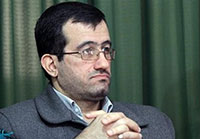The importance of auditory and visual memory in oral history
Hamid Ghazvini
Translated by: Fazel Shizrad
2019-9-11
 All humans have had the experience of remembering forgotten memoirs by seeing a particular object or photo, or hearing someone's voice. Such cases are directly related to human visual and auditory memory.
All humans have had the experience of remembering forgotten memoirs by seeing a particular object or photo, or hearing someone's voice. Such cases are directly related to human visual and auditory memory.
Psychologists believe that humans usually memorize their memories with a sign, such as a place or a particular image. For this reason, everyone, at first, tries to visualize mentally observations of past events and then expresses memories.
Experience and study of psychologists have shown that people who close their eyes while they are remembering memories are more successful. Because when they closed eyes, the connection between the mind and outside environment is disconnected and one can more easily visualize mentally.
This type of memory is widely used to learn and recognize lessons and skills related to childhood and school or to assist the elderly and to treat and control some mental and neurodegenerative diseases.
Some people have good visual and auditory memory and remember a lot of information as soon as they see a picture or hear a related sound, but there are also some who have serious problems.
One of the tasks of oral history interviewer is to stimulate this type of memory with the aim of reviving the interviewee's memories by asking detailed questions. Naturally, this may be difficult because of the passage of time or people's age. Sometimes different photos are replaced by other ones in narrator's mind and cause him to be encountered with trouble. It is even possible that a defective or inaccurate picture of some situations may be mistaken in expressing memories.
Some measures can be instituted to enhance and refine the visual and auditory memory, while patience and observance of the narrator's physical and mental state. It is important to note that stimulation of auditory and visual memory is a slow and careful process and any acceleration will impair the process.
Some measures are as follows:
1. Looking at old pictures and documents.
2. Watching movies that are directly or indirectly related to the subject of interview. (Documentary or fiction).
3. Listening to audio files at the same time.
4. Listening to the songs and music of that era.
5. Visiting some old friends and relatives and people related to the subject of interview.
6. Visiting some ancient objects.
7. Accompanying the narrator and visiting the interview areas and locations.
8. Tracing related images, such as a drawing of prison's room or operational area.
9. Seeing or referring to symbols of same era as flags, banners, tablets, etc.
10. Reading and repeating popular songs of slogans at the same time.
Number of Visits: 4583








The latest
- The Embankment Wounded Shoulders – 14
- An Eternal Lie!
- The 368th Night of Remembrance – Part 2
- Agents in Search for the Fighter
- The Embankment Wounded Shoulders – 13
- The Necessity of Standardizing Oral History and Criticism of General Mohsen Rezaei
- The 368th Night of Remembrance – Part 1
- Oral History News of Khordad 1404 (May 22nd – June 21st 2025)
Most visited
- Oral History News of Khordad 1404 (May 22nd – June 21st 2025)
- Najaf Headquarters Human Resources
- The Necessity of Standardizing Oral History and Criticism of General Mohsen Rezaei
- The 368th Night of Remembrance – Part 1
- The Embankment Wounded Shoulders – 13
- Agents in Search for the Fighter
- An Eternal Lie!
- The 368th Night of Remembrance – Part 2
How to send Imam's announcements to Iran
In the first part, the issue of funds, Hajj Sheikh Nasrallah Khalkhali - who represented most of the religious authorities - was also the representative of Imam. In Najaf, there was a money exchange office that cooperated with the money exchange offices in Tehran. Some of the funds were exchanged through him.Operation Beit al-Moqaddas and Liberation of Khorramshahr
After Operation Fat’h al-Mobin, we traveled to Kermanshah and visited Sar-e-Pol-e-Zahab before heading to Ilam. During Operation Beit al-Moqaddas, the 27th Brigade was still receiving support from the West. We maintained contact with individuals who had previously worked in Area 7 and were now leading the brigade. It was through these connections that I learned about Operation Beit al-Moqaddas.Memoirs of Hujjat al-Islam Reza Motalebi
Hujjat al-Islam Reza Motalebi is a cleric from Isfahan. Before the revolution, he was the imam of the Fallah Mosque – which was later renamed Abuzar Mosque. By his presence and efforts, Abuzar Mosque soon became a base for supporters of the Imam and the revolution. After the victory of the revolution, he played a role in uniting forces and maintaining political vitality in southwest Tehran.The Necessity of Receiving Feedback in Oral History
Whenever we engage in a task, we naturally seek ways to evaluate our performance — to correct shortcomings and enhance strengths. Such refinement is only possible through the feedback we receive from others. Consider, for instance, a basketball player whose shots are consistently accurate; should he begin shooting blindfolded, his success rate would rapidly decline, as he would be deprived of essential feedback from each attempt.

